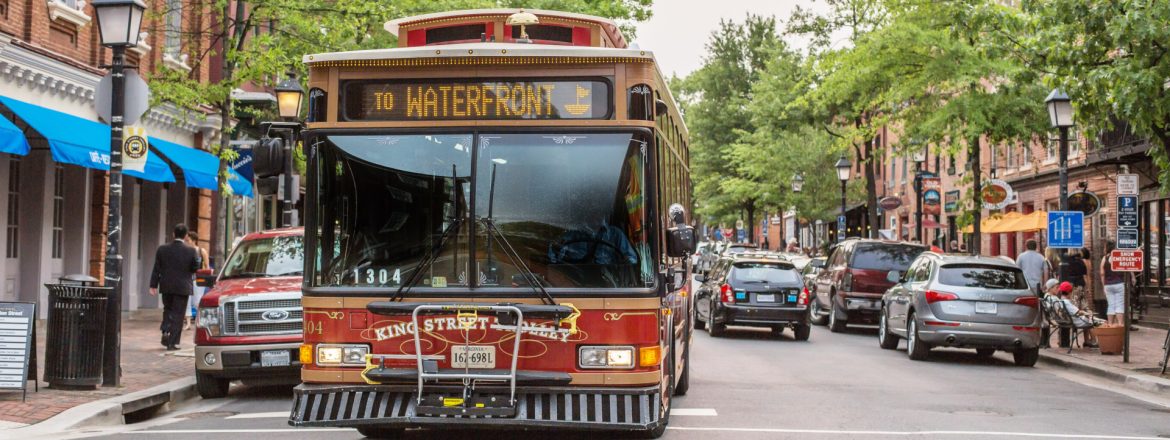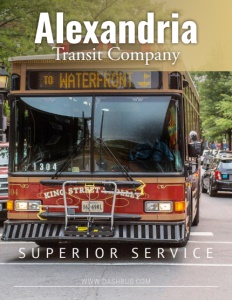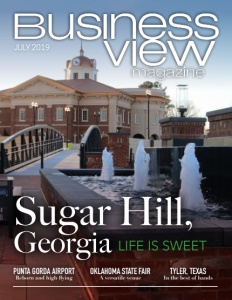The Alexandria Transit Company
Superior service
Business View Magazine interviews Josh Baker, GM of the Alexandria Transit Company, as part of our focus on best transportation practices in American cities.
The Alexandria Transit Company (ATC), known locally as DASH, an acronym for Driving Alexandria Safely Home, is the city-owned, non-profit, public bus system in Alexandria, Virginia, a city of 153,000 within the greater Washington DC metropolitan area. DASH provides safe and reliable, fixed-route, bus service within the city and connects its passengers with Metrobus, Metrorail, Virginia Railway Express, and all other local bus systems. It also operates the very popular King Street Trolley, which offers daily, free rides in the city’s central tourist district.
DASH operates a fleet of 85 transit buses, has 200 employees, and services approximately four million passenger trips, annually. Its annual operating budget is approximately $17 million; of that, approximately $3.5 million is composed of fares paid by the rider. Other revenues include charters and grants, and marketing programs. While subsidized heavily by the locality, DASH’s operating ratio is strong, relative to other systems. It is known as one of the top transit systems in the country, and has repeatedly been recognized for its quality customer service, reliability, and on-time performance.
In an effort to expand and enhance its already superior level of service, DASH is currently working on a Transit Vision plan, which, according to CEO and General Manager, Josh Baker, is a “rethinking of how people in Alexandria move around and how we provide services to them. We’ve been working throughout the year to talk about network concepts and thinking about strategies for the future of DASH service. One is designing a network focused on increasing ridership – we’re calling it the business model – focusing our services on corridors being frequent and accessible in the main areas of the city throughout the day. An alternative is to focus on coverage, which is intended to ask the question: ‘is it more important for our services to reach every area, or as many areas of the community as possible?’”
“So, we’re trying to figure out how to best apply the resources that we have, in the most efficient way, in the way the community want us to,” Baker continues. “And that’s really about where you use your money. It takes more resources to go to more places and people now have choices. They have options other than public transit, so what should public transit be? Should we continue to be a service that tries to get to everyone, or should we focus money and resources on dense areas, dense populations where you get the most people on the bus as possible? And we haven’t answered that question, yet. We’re now in the phase of people really getting engaged and talking about what those coverage concepts look like. Admittedly, the people who the coverage concepts do not serve to benefit, we’re hearing a lot from. Now, we’re working hard to figure out how to hear from the people who it does benefit.”
Another initiative in process is DASH’s zero emissions bus technology. “We’ve launched a feasibility study that’s about halfway done to examine how to plan our facilities and our services to suit the capabilities of electric vehicles,” Baker explains. “And we also applied for, and successfully obtained, funding to purchase six fully electric buses along with all of the infrastructure required to operate them. That money is coming from the Volkswagen diesel emissions scandal. Volkswagen was found guilty of falsifying tests and so the money from that settlement was put into a trust fund that’s designated for the implementation of clean vehicle technology. Our governor allocated a portion of the state’s money to a competitive grant program to fund the implementation of electric buses, particularly for systems that were serious about a fleet-wide transition. And we were one of the three transit systems in the state to receive those funds, and we are hopeful to be the first ones to put electric buses on the road in Virginia.”
In the midst of all of this self-generated activity, DASH has also had to respond to a major challenge handed to it by WMATA – the Washington Metropolitan Area Transit Authority. Baker explains: “Our heavy rail subway system, the Metro rail, has been in crisis for many years, as a result of 40-plus years of operating with limited to no investment in ongoing maintenance. WMATA has historically been underfunded as have many transit systems. It was a brand new and shining example of success and everybody was so proud of it and then they didn’t put money into it, and it got to the point where it was like running a brand new car and never changing the oil. Eventually, the car stops and you have to replace the engine.”
One of the side effects of that deferred maintenance has been a deterioration of the outdoor rail platform structures in Alexandria. “We have five Metro rail stations that are serviced by the Yellow and Blue lines of the transit system,” Baker notes. “As a result of their open exposure to the elements over the past 40-plus years, the station platforms are failing. And so, the Metro system has taken a radical approach to try to resolve the issue by completely closing all Metro rail service south of the Reagan National Airport, which is prior to the service coming to Alexandria. That’s about 8,000-plus passengers a day who are served on the Metro rail system in Alexandria.
“So, starting Memorial Day through Labor Day, there will be no service and, consequently, we at DASH are one of many entities partnering with the Metro system to provide bus bridging, which means people who ride the Metro rail system, instead of getting on a subway in Alexandria, will get on a DASH bus and be transported to the Reagan Airport Metro rail station in order to continue their trip. This is a huge undertaking that’s never been done before on this system, and as far as we know, there’s never been a shutdown of this magnitude. The goal is to be able to replace and repair the platforms very quickly by having no rail service to navigate and they’re expecting to get that done within four months.
“So, we’ve had to expand our bus fleet from 85 buses to over 120 vehicles and we’ve had to hire somewhere in excess of 50 additional employees, just bus operators, to run service, this summer. It’s being paid for by the Metro rail system, and using the funds that we’ve secured from Metro, we’ve been able to identify buses elsewhere in the country that were nearing, or at, retirement age, but still have enough life in them to be able to operate for four months. And we were very successful partnering with the Westchester County, NY Liberty Line’s transit system. We identified buses that they were finished with and were in very good shape. We have rehabilitated those and prepared them for service. We’ve also gotten a few from some other systems and that’s how we’re getting that fleet. Then, those buses will come off the road after our service is done.”
Increasing DASH’s challenge is the need to quickly identify, hire, and train new drivers. “We’ve been actively recruiting and onboarding operators,” says Baker. “We’re using a lot of school bus drivers; we’ve also been successful in getting some transit systems that serve universities. Oftentimes, when a transit system serves a major university, they scale back their service during the summer. So, we’ve hired some of those folks; many of those systems use students to operate their buses and so they’re licensed and certified and capable of operating the vehicles like any other driver. So, we’ve hired them to spend the summer in the Washington area, learn a little bit more about how transit works here and to operate the shuttles for us. That’s been our strategy.”
Baker hopes that the summer’s tight construction schedule will be met, but, just in case, he says that after the first few weeks of service are complete and things are running smoothly, he’s going to turn his focus to figuring out how DASH can sustain the added service after Labor Day, if necessary. Meanwhile, Marketing & Communications Manager, Whitney Code, is somewhat more assured. “This is actually the first in a series of platform improvement projects that Metro intends to undergo,” she states. “And as the first, I think they understand how important this is to be completed in a timely fashion. I’ve also been informed that there have been some incentives built in for the contractor to make sure that they stay on time. So, they are very focused on making sure that this project wraps as and when it should.”
Finally, Baker reveals that DASH is getting ready to launch a new mobile app that will allow its passengers to purchase bus tickets via their smart phones. “That’s a new thing for us and we’re the first system in this region to be doing this, so everyone’s looking at us to see how it goes,” he avers. “We’re launching that, simultaneously, with the shutdown in the hopes that it will provide a convenience for our passengers. In addition, we’re doing a special buy-down of fares. Our normal fare is $1.75, and we’re buying it down to a dollar if you use the mobile app.”
Baker hopes that the new technology will ultimately replace the current system. “This region has what’s called Smart Trip, which is a regional fare card type system that is now getting quite old,” he remarks. “It came out in the early 2000s. It’s can be used in all the transit systems and so, we’re working to pilot this mobile ticketing in the hopes that the rest of the region will adopt it and it will eventually replace the Smart Trip program.”
AT A GLANCE
WHO: The Alexandria Transit Company
WHAT: A city-owned, non-profit, public bus system
WHERE: Alexandria, Virginia
WEBSITE: www.dashbus.com
PREFERRED VENDORS
Allison Transmission – www.allisontransmission.com
Always Moving Forward: The Latest in Transit Bus Transmission Technologies
According to the American Public Transportation Association (APTA), Americans took 10.1 billion trips on public transportation in 2017, and public transportation ridership has increased by 31% since 1996—a growth rate higher than the 20% increase in U.S. population.
While these figures include modes of transportation other than transit buses (subway, commuter rail, etc.), clearly there is significant reliance on public transportation by a large sector of the population in America and even more so outside the U.S.
Allison partners with transit bus fleets around the globe to provide maximum operating value, ease of operation, enhanced driver control and superior passenger comfort. Our technologies have and will continue to make us a leading global supplier of innovative, reliable transit bus propulsion solutions, ensuring that commuters get to the places they need to be.
Technologies for Today
Allison offers a complete range of fully automatic transmissions and hybrid propulsion systems for transit and city buses. There are more than 200,000 Allison-equipped city buses in operation worldwide, at work in more than 20 of the world’s largest cities.
In our fully automatic transmissions, our patented torque converter offers increased performance, faster acceleration and greater operational flexibility, as well as reduced wear and tear with no mechanical clutch. Designed to handle frequent starts and stops, and with fuel-saving technology built-in, an Allison Automatic reduces cost of ownership with lower repair costs and enhanced fuel economy.
Our hybrid system dramatically reduces both diesel fuel consumption and CO2 emissions, improving fuel economy and offering an option that is smart, green and efficient.
Technologies for Tomorrow
Allison is introducing the new ABE Series, the first e-axle advanced ultra-low floor electric bus powertrain system in the market. The ABE Series e-axles are one of the world’s most powerful and compact fully integrated electric axles for the transit bus market. It meets the power and space demands of the transit bus industry, including heavy double-decker, articulated and three-door buses.
Beyond today’s proven technologies Allison is poised to meet the transit needs of tomorrow. No matter which propulsion solution best meets the needs of the market, Allison’s customer focus, innovative thinking and commitment to reliability allows fleet owners and drivers to work confidently.



